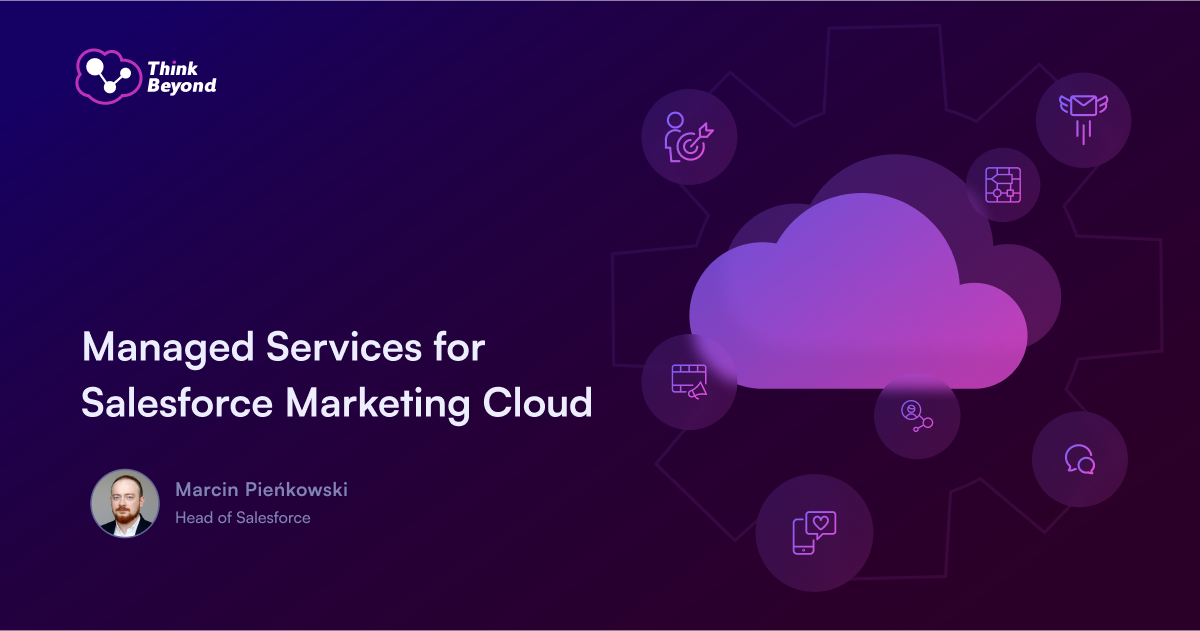Without good marketing, even the best products and services can easily be overlooked. Marketing helps businesses get noticed in a busy marketplace and build trust with their customers. As marketing guru Seth Godin says,
Our job is to connect with people and interact with them in a way that leaves them better than we found them, helping them move closer to where they want to be.
This blog post will examine the main advantages of Salesforce Marketing Cloud managed services and how they enable brands to attain measurable marketing success.
How Salesforce Marketing Cloud Managed Services Address Business needs
Whether you need admin support, integrations, or strategic guidance, we help you maximise the value of Salesforce. Successfully and cost-effectively. — Think Beyond, Salesforce Managed Services Provider
Organisations often seek external expertise because their internal capabilities have reached their limits. With Salesforce Marketing Cloud managed services, companies can choose the cooperation model that best fits:
- A single expert for focused support,
- A dedicated team for comprehensive management,
- Or ad hoc help for occasional needs.
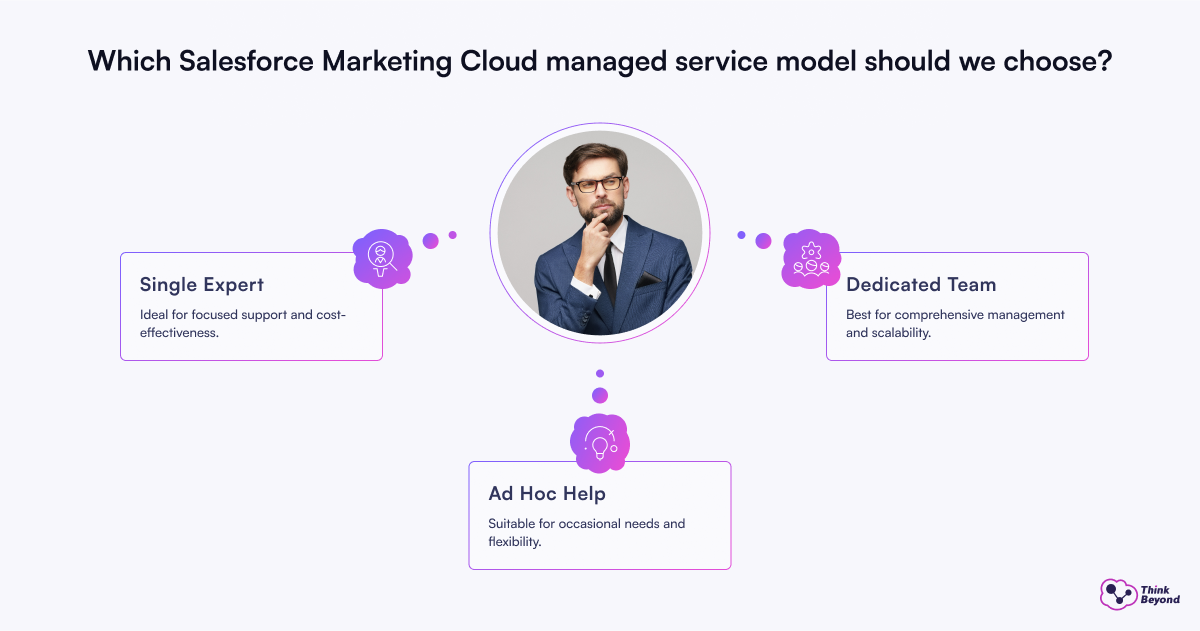
Managed services provide support with a range of tasks and ensure marketing efforts remain compliant and secure. This allows organisations to concentrate on delivering personalised customer experiences, free from technical issues. So, what specific challenges do managed services for Salesforce Marketing Cloud have to deal with?
Lack of in-house Salesforce Marketing Cloud experts
Existing staff members don’t always have the skills to handle Salesforce Marketing Cloud’s complexity. The system becomes more intricate as businesses add more functionalities, and this requires specialised skills for proper maintenance. Finding skilled experts takes time, and it can take months to get them completely proficient. Companies that involve Salesforce Marketing Cloud consultants get immediate access to certified technical teams and support for all Marketing Cloud requirements around the clock.
Need for adaptable marketing automation software
Marketing departments must deliver tailored experiences in multiple channels. This causes a need for platforms that can grow with their operations. Salesforce Marketing Cloud is adaptable and can support enterprises of all sizes, from start-ups to large corporations. Additionally, these solutions can grow with the support of managed services without interfering with regular business operations or jeopardising business continuity.
Challenges in coordinating Sales Cloud and Service Cloud
Many organisations struggle to coordinate their marketing, sales and service departments effectively. These functions must work together to deliver consistent customer experiences. Managed services support revenue teams in closing deals faster growing the pipeline. Through the creation of unified customer profiles, businesses are able to use shared data across platforms to deliver customised marketing campaigns.
Core Services Included in Salesforce Marketing Cloud Managed Services
Salesforce Marketing Cloud has evolved from a core email marketing platform, acquired as ExactTarget in 2013, into a sophisticated, omni-channel solution that unifies data, AI, and marketing automation across customer touchpoints.
Over time, Salesforce expanded its marketing ecosystem with acquisitions such as Pardot, a leading B2B marketing automation platform, enhancing capabilities in lead nurturing, scoring, and sales alignment. Powerful tools like Journey Builder, Audience Studio, and the Einstein AI suite enable smarter customer journeys and highly targeted personalisation, while Marketing Cloud Intelligence (formerly Datorama) delivers deeper, real-time campaign insights to maximise ROI.
Most recently, the launch of Marketing Cloud Next marked a new era of convergence, integrating AI-powered autonomous agents to create seamless experiences across both B2C and B2B use cases while streamlining workflows and data management for marketers
Managed services for Marketing Cloud rest on two main pillars that support organisations throughout their marketing automation experience:
- campaign execution and optimisation
- strategic guidance and evolution.
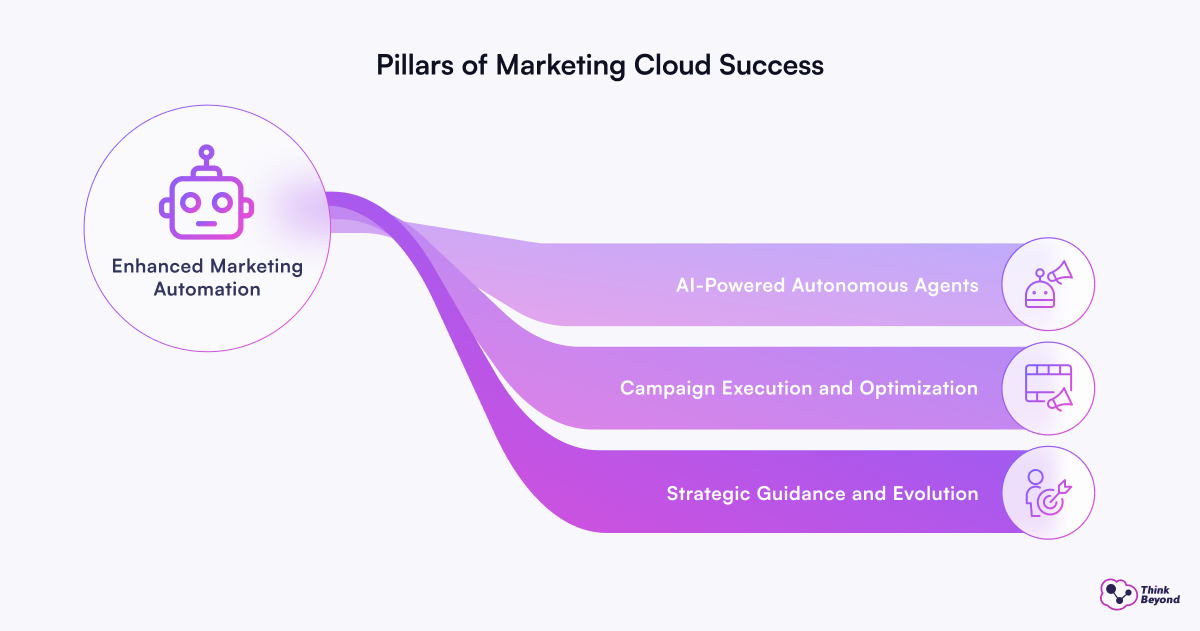
They work together to deliver peak performance, so let’s have a closer look at each of these areas.
Campaign Execution and Optimisation
Executing and optimising campaigns in Salesforce Marketing Cloud (SFMC) is a dynamic process that goes far beyond simply sending messages to your audience. It involves careful planning, real-time adjustments, and leveraging powerful marketing automation and analytics tools to ensure each campaign delivers maximum impact:
- Designing, building, and launching complex customer journeys in Journey Builder, orchestrating multichannel campaigns across email, SMS, push notifications, and advertising. Testing and optimising these customer journeys for maximum customer engagement.
- Development of responsive email templates, landing pages, and dynamic content using Content Builder and AMPscript, ensuring your communications look great and perform well on any device.
- Scheduling and executing campaign sends, whether it’s email, SMS, or other channels, while managing send times, frequency, and audience targeting.
- Seamless data flow between SFMC and other components, such as Salesforce Sales Cloud, Service Cloud, external CRMs, e-commerce platforms, or data warehouses, so your marketing data is always up-to-date.
- Tracking campaign metrics like open rates, click-through rates, and conversions, providing regular reports and actionable insights to drive continuous improvement.
- Running A/B tests on subject lines, content, and send times, using results to optimise future campaigns for better performance.
- Delivery of highly targeted, personalised experiences to each customer segment.
Strategic Guidance and Improvements
Beyond day-to-day operations, strategic guidance ensures your SFMC instance continues to evolve. This includes collaborating with your team to develop a long-term roadmap, identifying new features, and planning future enhancements:
- Developing a long-term SFMC strategy, identifying new features to adopt, and planning enhancements that align with your business objectives.
- Staying ahead of the curve with releases and guidance on how to best use new functionalities to boost your marketing effectiveness.
- Timely support for any technical issues, errors, or unexpected platform behaviour—minimising downtime and disruption.
- Ongoing training and enablement help your internal marketing team become more proficient and self-sufficient with Marketing Cloud.
How Managed Services Optimise Key Marketing Cloud Features
A composite of the results from five organisations using Salesforce Marketing Cloud yielded a return on investment (ROI) of 299% over a three-year period.
— Forrester Total Economic Impact™ of Salesforce Marketing Cloud
Marketing Cloud comes packed with features that can truly elevate any marketing efforts—if you know how to use them. That’s where Salesforce experts come in, helping businesses unlock all the platform’s possibilities and make the most of every tool it offers.
Marketing Cloud Engagement: Customer Journeys and Experiences
Salesforce consultants focus on making the most of engagement marketing tools to create personalised, multichannel marketing campaigns. Managed services for these tools involve:
- Designing smooth, cross-channel customer journeys that nurture prospects and keep customers engaged throughout their lifecycle (Journey Builder).
- Building responsive email templates with dynamic content and automating sends to ensure the right message reaches the right audience at the perfect time (Email Studio).
- Using precise timing and personalisation to deliver targeted SMS, push, and in-app messages that boost customer interaction and loyalty (Mobile Studio).
- Coordinating social media campaigns to align with overall goals while analysing social data to improve marketing strategies on the go (Social Studio).
- Handling audience segmentation, retargeting, and multichannel ad campaigns to increase ROI and raise brand awareness (Advertising Studio).
At its core, Marketing Cloud managed services aim to deliver seamless, data-driven customer experiences across every digital touchpoint, helping businesses connect with their audience more effectively.
Marketing Cloud Account Engagement: Lead Scoring and Nurturing
Lead scoring helps find prospects who are most likely to convert based on their marketing activity engagement. Salesforce implementation teams customise scoring models. They review touchpoints and give appropriate values based on influence. A technical white paper download gets a higher score than a simple email open. Custom scoring categories help businesses score prospects on multiple products at once. This makes it easier to spot cross-selling opportunities. Sales teams can prepare customer briefs better with this detailed approach.
Marketing Cloud Intelligence: Transforming Raw Data into Actions
Intelligence, formerly known as Datorama, provides comprehensive marketing analytics, visualisation, and reporting tools designed to cover every stage of campaign performance. Marketers can view a unified view of the outcomes of their campaigns in real-time thanks to its integration of data from all marketing channels and sources. This complete view helps teams keep an eye on important numbers like customer engagement rates, conversions, return on investment (ROI), and how customers act across email, mobile, social, and advertising campaigns.
Einstein AI: Send Time Optimisation and Engagement Scoring
The capabilities of Einstein’s AI significantly enhance marketing automation. The tool looks at past email campaign data to find the best time to send emails to each recipient. This helps maximise engagement rates. Einstein Engagement Scoring groups subscribers into personas like Loyalists, Window Shoppers, Selective Subscribers, and Winback/Dormant. This information is helpful when creating smart journey splits that target messages to the most responsive subscribers.
Other Integrations: CRM, ERP, and third-party tools
CRM integration services create one source of truth that helps teams communicate better throughout an organisation. Marketing Cloud Connector lets teams send emails from Salesforce CRM and watch customer engagement data immediately. Customer data stays in one unified system that updates right away and remains available to everyone. Connecting marketing with CRM platforms helps businesses store marketing data, send targeted emails, and track customer interactions directly in Salesforce.
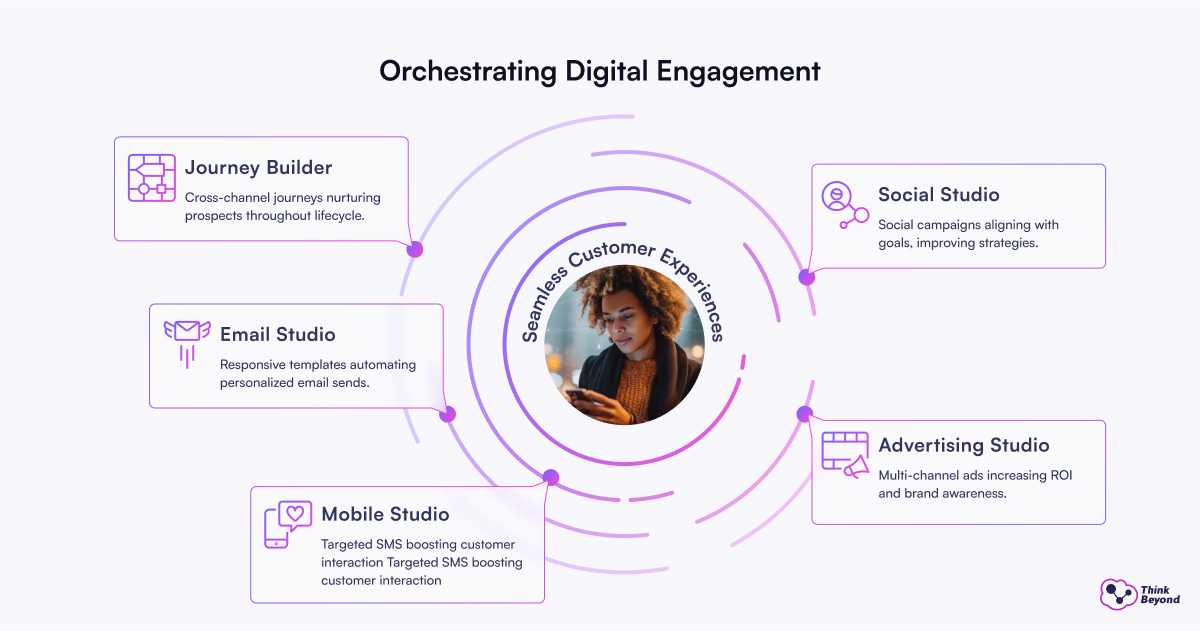
Optimise Your Marketing Approach with Marketing Cloud Managed Services
Excellence in marketing demands constant fine-tuning. Salesforce managed services continuously improve automation workflows and audience segmentation and reshape how businesses reach prospects and customers. Expert guidance turns complex marketing challenges into strategic advantages. Companies can now deliver perfectly timed experiences that strike a chord with modern consumers.
When it comes to Marketing Cloud, partnering with the right Salesforce provider is about so much more than just getting technical support. A truly reliable managed services partner specialising in Marketing Cloud becomes an extension of your team—someone who understands your business goals and helps you unlock the platform’s full potential.
